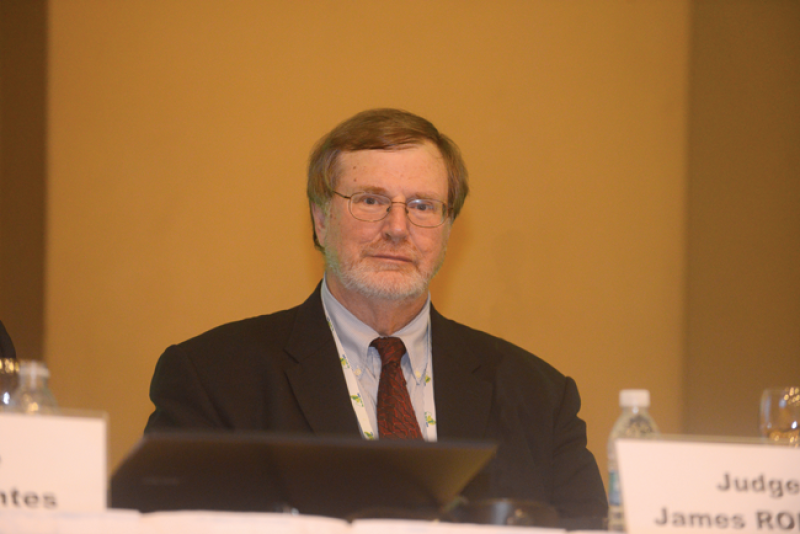
“Half of you in the audience are using mobile phones right now, so the WiFi technology standards must be working pretty well!” So said Judge James Robart, of the US District Court for the District of Washington, yesterday. Unfortunately, though, the three-hour discussion “Focus on FRAND” suggested that there are in fact many and increasing questions arising from the licensing of standard-essential patents (SEPs).
Robart was one of three judges who spoke during the discussion, which was chaired by Michael Fröhlich of BlackBerry, who is co-chair of AIPPI’s Standing Committee on Standards and Patents. The panel also included contributions from IT industry representatives who spanned the licensor/licensee spectrum: Latonia Gordon from Microsoft, Monica Barone of Qualcomm and Monica Magnusson of Ericsson.
At the end, Gertjan Kuipers, co-chair of the Committee, said the long discussion showed that “FRAND is a two-way street, there are offers and counter-offers, it is case-specific and we have to find the right balance”. In this context, he added: “Litigation needs to be equally unattractive to both parties!”
A view from the bench

The stage for the discussion was set by Judge André Fontes of the Brazilian Federal Court of Appeals, who set out the Brazilian judicial system and illustrated the complexity of FRAND cases. Speaking in Portuguese, he said that FRAND cases raise patent validity, infringement and competition issues which in Brazil would have to be heard in three different venues: “No single entity looks at all three levels of the case.”
Judge Peter Meier-Beck of Germany’s Federal Supreme Court talked the packed room through the line of cases in the German courts and the Court of Justice of the EU (CJEU) dealing with FRAND issues, which have clarified to some extent the responsibilities of patent owners and willing licensees. He focused on three decisions in particular: the Standard-Spundfass and Orange Book Standard cases at the Bundesgerichtshof and the Huawei v ZTE case at the CJEU, and how they connect with each other.
These cases have addressed the patent and competition issues that can arise given the conflict between the patent owner’s right to refuse to grant a licence and the desire to promote interoperability and product compatibility through technology standards. Standard-Spundfass addressed what constitutes discrimination by the patent owner. “Stricter requirements apply when the patent owner’s dominant position derives from standard-essentiality,” said Meier-Beck.
The subsequent Orange Book case addressed in more detail the licensee’s defence, he added, and when a refusal to license may constitute an abuse by the patent owner: “The proprietor must comply with conditions that seek to ensure a fair balance – that’s not a one-sided argument, but a balance is necessary between the interests of both sides.”
The lesson of Huawei v ZTE, decided this summer, is not that the Orange Book ruling is dead, as some commentators have suggested, but that it has to be applied in a slightly modified way, said Meier-Beck. The CJEU said that undertaking to grant a licence to willing parties creates a legitimate expectation and that a refusal to licence may in principle constitute an abuse. But it did not deny the right of patent owners to seek injunctions before relevant tribunals in specific circumstances. “A proprietor cannot bring an action without notice of prior consultation with the alleged infringer. The proprietor must specify the royalty and why it is calculated. And the alleged infringer must diligently respond to the offer and if it does not accept then submit a counter-offer,” explained Meier-Beck.
He added, however, that the European decisions did not solve the problem of the substantive assessment of FRAND conditions. By contrast, the United States has seen several decisions where judges have gone as far as to set FRAND rates. The first of these to do so was Judge Robart, in the case between Microsoft and Motorola (which has recently been settled).
Robart said that any FRAND rate calculations in the US have to start with the 15 Georgia-Pacific factors, though he added that these have often been criticised as imprecise: “Judges and juries have been able to look at factors they think are most interesting or important in deciding royalty rates for all patents.”
The numerous recent cases in the US have shown that having a FRAND obligation does change the emphasis, he added: “We now have almost universal acceptance of that principle.” In particular, the Federal Circuit in the Ericsson v D-Link case had indicated that the 15 factors should not be applied automatically. Rather, any of the factors that are not relevant should be removed.
Robart also stressed the importance of looking at the specific facts of the case: “We need to pay more attention to the precise terms of the patent holder’s (F)RAND obligations. There is no one (F)RAND analysis, it would be implicit from the terms of your obligation. It’s an important point.”
Take your partners please
The wide-ranging discussion covered a variety of questions, skilfully marshaled by Fröhlich. These included when injunctions are appropriate, the risks of patent hold up and royalty stacking, the recent changes to the IEEE standards policy and the growth of competition cases. The panellists also drew analogies between injunctions and pornography (“you know it when you see it!”) and between renting a room in a hotel and taking a licence to a patent (“is pay- TV included in the price?”).
One of the more complex questions raised was the tension between the commercial reality that most companies prefer portfolio licensing and the practical fact that courts can only deal realistically with disputes over a handful of patents, at most. That in turn prompted discussion of whether, and when, ADR is appropriate for resolving these kinds of disputes.
Magnusson, who stressed that she was speaking in a personal capacity, said that from a commercial point-of-view, the crucial thing is balancing the competing interests: “Business negotiations are like the Fandango dance: it’s not the same if you have the guitar with no dancer, and it’s not the same if you have the dancer without the guitar. It takes two to Frandango!”










